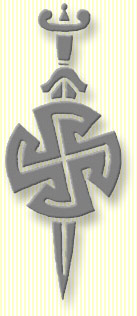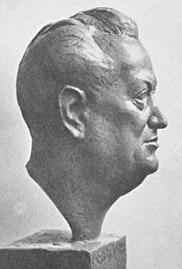
May 25 The link was Rudolf Glandeck von Sebottendorff (above). The son of a Silesian railway engineer, Sebottendorff was born Adam Alfred Rudolf Glauer. He travelled to Turkey in 1900, where he was adopted by Baron Heinrich von Sebottendorff in 1909, and also claimed to have been initiated into Freemasonry. Changing his name and taking Turkish citizenship, he returned to Germany in 1913. Sebottendorff's version of Freemasonry did not prevent his striking up a friendship with the Germanenorden chancellor, Hermann Pohl, who violently opposed Freemasonry as being international and Jew-ridden, but who used masonic terminology and organizational structure, believing this would insure secrecy..."
1787 Fifty-five delegates from 12 states begin to gather in Philadelphia for the first session of the Constitutional Convention. The delegates will repeal the weak and ineffectual "Articles of Confederation" and draft a new US constitution; the sensible result of many compromises between nationalists and federalists.
1803 Birth: Ralph Waldo Emerson, US writer, essayist, philosopher.
1810 Argentina declares independence from Napoleonic Spain. (Now a National Day).

1844 Stuart Perry of New York City patents a gasoline engine. "...The most effective internal combustion engine design until this point was that of Stuart Perry. Patented in 1844 and 1846, Perry's engine was engineered and built in New York City. Very much like contemporary internal combustion engines, this two-cycle engine was of a vertical design and had a cylinder head with separate inlet and exhaust valves. Other traditional features included a piston and cylinder, camshaft, water pump, throttle valve, igniter, and a lubrication system. Many experts are in agreement that Charles E. Duryea built America's first gasoline-powered car in the 1890s. Others cite Elwood Haynes' car of approximately the same time. The man who deserves perhaps the greatest amount of credit for perfecting the gasoline-powered internal combustion engineâand thus forging the way for the mass production of gasoline-powered automobilesâis German engineer Nicolaus August Otto. It was Otto's four-cycle design that transformed the internal combustion engine into a viable means of motivation for the masses..."
1889 Birth: Igor Sikorsky, Russian born aviation engineer. "Igor I. Sikorsky, the legendary aviation pioneer, will long be remembered as the man who gave the world its first practical helicopter. This achievement alone was significant enough to ensure the gentle Russian immigrant's place in the history books, but it was only one facet of an extraordinary man's remarkable career...a career that paralleled the history of powered flight. Often described as a humble genius, Mr. Sikorsky had already achieved worldwide recognition in two other fields of aviation before he built and successfully flew his VS-300 helicopter in 1939. Born in Kiev, Russia, on May 25, 1889, Mr. Sikorsky developed an early interest in aviation, thanks largely to the influence of his mother, who was a doctor, and his father, a psychology professor. A youthful tour of Germany in the company of his father, during which he first heard of the Wright brothers and came in detailed contact with the work of Count Zeppelin, more or less settled the question of what career the youthful Sikorsky was to follow..."

1892 Birth: Joseph Broz Tito, Yugoslavian soldier, political leader. "...Tito was born on May 7th but celebrated his birthday on May 25th after he became president of Yugoslavia...the ruler of Yugoslavia between the end of World War II and his death in 1980. Tito was born Josip Broz in Kumrovec, northwestern Croatia, in an area called Zagorje, which was then part of Austria-Hungary. He was the seventh child in the family of Franjo and Marija Broz. His father Franjo Broz was a Croat, while his mother Marija (née Javeršek) was Slovenian. After spending part of his childhood years with his mother's father in Podsreda, he entered the primary school in Kumrovec, and failed the first grade..."
1895 Writer Oscar Wilde is sentenced to two years hard labor in Britain for being a sodomite.
1909 Britain passes the Indian Councils Act, giving more power to local legislative councils in India.
1911 Mexican Civil War: President Porfirio Diaz resigns after revolutionist forces defeat government troops.

1912 Volkishness: May 24-25 Theodor Fritsch, twenty prominent Pan-Germans, antisemites, and disciples of Jorg Lanz von Liebenfels and Guido von List found two groups to indoctrinate German society. Karl August Hellwig, a List Society member since 1908, now heads the Reichshammerbund, which has grown into a confederation of all existing Hammer groups. Hermann Pohl, from Magdeburg, becomes head of the Germanenorden, a secret twin-organization. (Bundesarchiv, Koblenz) "There are two claims made about the German Nazis that have been debunked by scholarly research but which continue to enjoy popular interest. The first is that Adolf Hitler and the Nazis were driven by an occult agenda; that their early success, and ultimate failure, was a result of either supernatural intervention, or their magical attempts to control the supernatural. A second claim is found in certain branches of conspiracy theory: that the Nazis were created by the Freemasons. It is a curious historical footnote that a link can be found between the National Socialist German Workers' Party (NSDAP), founded in 1920, and the Germanenorden, a magical fraternity founded at a conference of occultists in May of 1912, organised by disciples of Guido von List and Adolf Lanz, aka JÃrg Lanz von Liebenfels in the home of Theodor Fritsch.

1915 WW1: The second Battle of Ypres ends with casualties around 105,000, as the Germans utilize poison gas for the first time.

1925 Scopes Trial: A young teacher, John Scopes, goes on trial in the small town of Dayton, Tennessee. Charged with teaching Darwin's theory of evolution, the case, already known as The Monkey Trial, is the first under a new law brought in last month by Bible fundamentalists. The defence is conducted by civil rights lawyer Charles Darrow.

1927 The Movietone News is shown for the first time at the Sam Harris Theatre in New York City. Charles Lindbergh's epic flight aboard the Spirit of St. Louis is featured. These newsreels will be produced for showing in theatres until 1967 when competition from TV news will force them into extinction.
1929 Weimar: Ernst 'Teddy' Thalmann, leader of Germanys Communist Party, provokes a series of riots in Berlin's working-class districts.
1933 An agreement is reached in Berlin between Hjalmar Schacht, Hitler's economics minister, and John Foster Dulles, the international attorney for literally dozens of Nazi enterprises. This new pact calls for all Nazi trade and commerce with the US to be coordinated with The Harriman International Co., headed by Averell Harriman's first cousin, Oliver. Max Warburg and Kurt von Schroeder are also involved in the negotiations.
1934 Siegmund Warburg immigrates to London.

1934 Birth: Ron Nessen, newsman, Ford White House Press Secretary.
1935 The SA stirs up anti-Jewish riots in Munich.
1939 The British government sets a limit of 75,000 Jewish refugees into Palestine over the next five years.

1939 Stalin's purges have by now cut across Russian society. A total of 98 of the 139 central committee members elected in 1934 have been shot and 1,108 of the 1,966 delegates to the 17th Congress arrested. The secret-police reign of terror annihilates a large portion of every profession. Deaths have been estimated in the millions, including those who perished in concentration camps.
1940 WW2: King Leopold of the Belgians surrenders.
1941

1944 Birth: Frank Oz, in Hereford, England, puppeteer.

1944 WW2: The German army estimates that 5.16 million Russian prisoners of war have been captured since 1941. Fewer than 1.8 million are still alive.
1945 Science fiction author and futurist Arthur C. Clarke proposes the then novel idea of placing relay satellites in geosynchronous orbit.
1951 Guy Burgess and Donald Maclean, British foreign office officials, disappear from London. It will later be discovered that they had spied for Russia.
1960 During China-Nepal discussions on their border and ownership of Mount Everest, a Chinese team reach the summit via the north face and plant a Chinese flag and bust of Mao Zedong.
1963 The Organisation of African Unity (OAU) is established at Addis Ababa, Ethiopia. The OAU charter, signed by the 32 heads of state, seeks to promote unity among African states and to oppose colonialism.
1968 The Gateway Arch, part of the Jefferson National Expansion Memorial in St. Louis, is dedicated.
1969 The Sudanese government is overthrown in a military coup led by Colonel Jaafar Nimeiri.
1972 The last of the US 'Corona' spy satellites is launched from Vandenberg Air Force Base, California.
1977 China lifts its ban on the works of Shakespeare, which had been denounced as bourgeois during the cultural revolution.
1981 Twenty-five year old Dan Goodwin, with three suction cups and a Spiderman costume, begins to scale the world's tallest building; the Sears Tower in Chicago, Illinois. It takes Goodwin six hours to reach the 50th floor of the skyscraper, where he stops for a few minutes, talks with the police, assures them of his safety, and makes the rest of the climb in about an hour. The police agree not to bother him until he gets to the top where he is arrested for trespassing. Goodwin will be released after paying a fine.
1982 Falklands War: At least 25 men die in seas around the Falkland Islands when the container ship Atlantic Convoy and the destroyer HMS Conventry are hit. The container is the second victim of the French-built missile, the Exocet, which sank HMS Sheffield on 4 May. The potency of the Exocet is making it difficult to protect the British Task Force.
1989 Mikhail Gorbachev is elected to the new post of Executive President in the Soviet Union.
1991 15,000 Ethiopia Jews, known as Falashas, are airlifted from Addis Ababa to Israel as rebel forces approach the Ethiopian capital.
1992 Veteran Italian politician Oscar Luigi Scalfaro is elected president.
1993 Guatemalan President Jorge Serrano dissolves congress and suspends the constitution amid fears of a coup.
1994 Russian writer Alexander Solzhenitsyn, ending a 20-year exile in the West, leaves his home in Cavendish, Vermont, to begin his long journey back to Russia.
1995 A major flare-up in the Bosnian war begins when NATO launches air strikes against ammunition bunkers near Pale.
1996 Bulgaria's King Simeon II returns home after 50 years of exile to a rapturous welcome from royalist crowds and a cold-shoulder from the socialist government.
2001

2002

2003

2004

2005

2005

2005

2005

2005

Visit:




 Visit:
Visit:

Click Here to email the History: One Day At a Time webmaster.